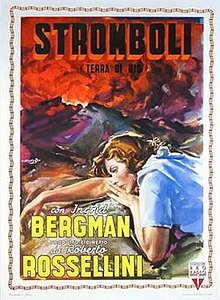Stromboli (film)
| Stromboli | |
|---|---|

Italian theatrical release poster
|
|
| Directed by | Roberto Rossellini |
| Produced by | Roberto Rossellini |
| Screenplay by |
Sergio Amidei Gian Paolo Callegari Art Cohn Renzo Cesana |
| Story by | Roberto Rossellini |
| Starring |
Ingrid Bergman Mario Vitale |
| Music by | Renzo Rossellini |
| Cinematography | Otello Martelli |
| Edited by | Jolanda Benvenuti |
|
Production
company |
Berit Films
RKO Radio Pictures |
| Distributed by | RKO Radio Pictures |
|
Release date
|
|
|
Running time
|
107 minutes (USA cut: 81 min.) |
| Country | Italy United States |
| Language | Italian, English, Spanish |
| Budget | US$900,000 |
Stromboli, also known as Stromboli, Land of God (Italian: Stromboli, terra di Dio), is a 1950 Italian-American film directed by Roberto Rossellini and featuring Ingrid Bergman. The drama is considered a classic example of Italian neorealism.
Bergman plays Karin, a displaced Lithuanian in Italy, who escapes the internment camp by marrying an Italian POW fisherman (Mario Vitale), whom she met in the camp on the other side of the barbed wire. He promises her a great life in his home island of Stromboli, a volcanic island located between the mainland of Italy and Sicily. She soon discovers that his home island is very harsh and barren, not at all what she expected, and the people, very traditional and conservative, show hostility and disdain towards this strange, foreign woman.
Adding to her difficulties, Karin speaks little Italian. She becomes increasingly despondent and eventually wants to escape the volcano island. The film also features documentary-like segments about fishing and an actual evacuation of the town after an eruption of the volcano. Most villagers are played by actual people from the island, as is typical of neorealism.
The film is the result of a famous letter from Ingrid Bergman to Roberto Rossellini, in which she wrote that she admired his work and wanted to make a movie with him. She and Rossellini set up a joint production company for the film, Societ per Azioni Berit (Berit Films, sometimes written as Bero Films), and she also helped Rossellini to get a production and distribution deal with RKO and its then owner, Howard Hughes, thus securing most of the budget together with international distribution for the film. Originally, she had approached Samuel Goldwyn, but he bowed out after having seen Rossellini's film Germany, Year Zero.
The terms of Rossellini's contract with RKO stated that all footage had to be turned over to RKO, who would edit an American version of the film, based on Rossellini's Italian version. However, the US version was eventually made without the director's input. Rossellini protested, and claimed that RKO's 81 minute version was radically different from his original 105 minute version. Rossellini got support from Father Félix Morlión, who had been involved in the screenwriting. He sent a telegram to Joseph Breen, director of MPPDA's Production Code Administration, urging him to compare the original script with the RKO version, as he felt that the religious theme he had written into the screenplay had been lost. The conflict eventually led to Rossellini and RKO taking legal action against each other over the international distribution rights to the film. The exact outcome is unknown, but it can be noted that the unrestored RKO version of the film, as distributed, is 102–105 minutes long and contains credits that were missing in the first RKO version; but it still has 1950 as the production year, and the same MPAA number as the 81 minute version. This indicates that the differences were resolved rather quickly.
...
Wikipedia
